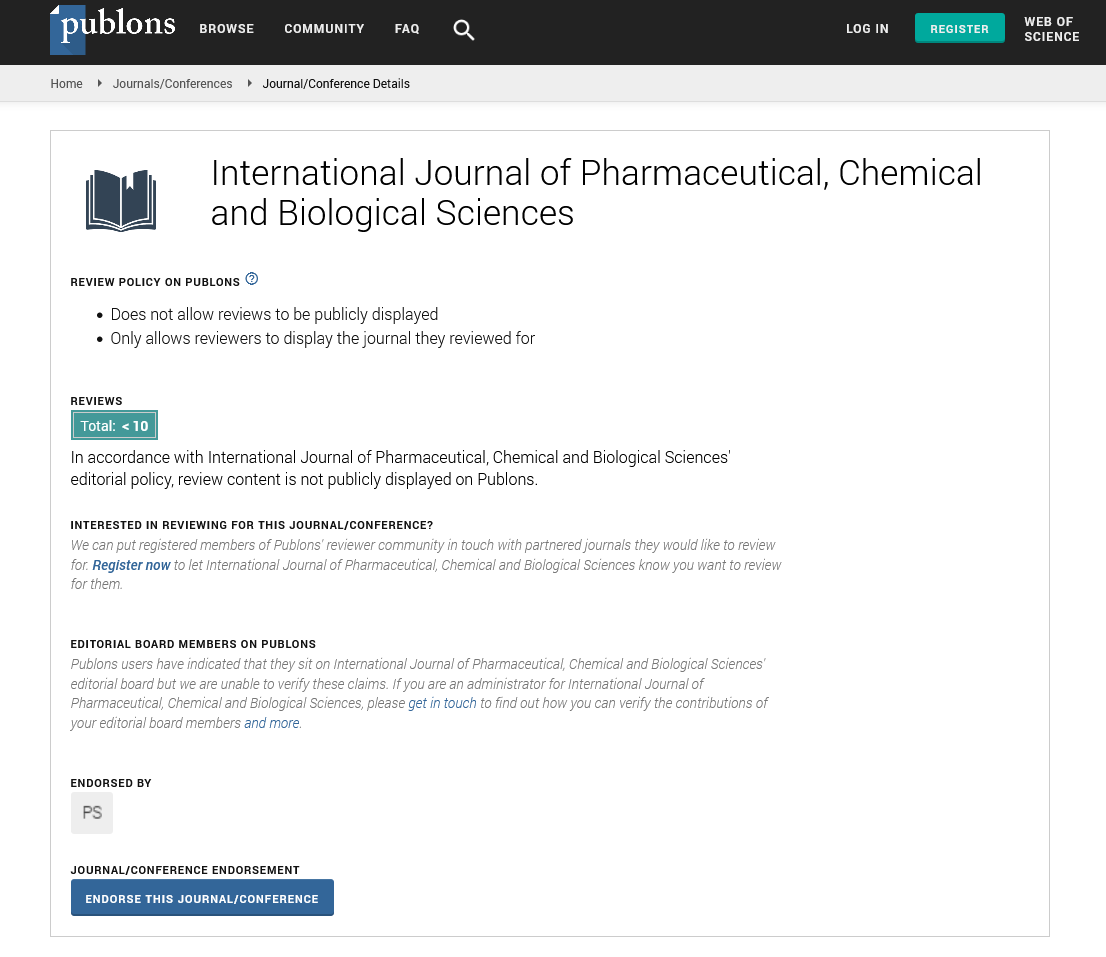Short Communication - International Journal of Pharmaceutical, Chemical and Biological Sciences ( 2023) Volume 13, Issue 2
The Power of Nutrition: Fueling Your Body for Optimal Health
Gwen Johnson*Gwen Johnson, Department of Chemistry, University of Mexico, USA,
Received: 31-May-2023, Manuscript No. ijpcbs-23-113764; Editor assigned: 02-Jun-2023, Pre QC No. ijpcbs-23-113764 (PQ); Reviewed: 16-Jun-2023, QC No. ijpcbs-23-113764; Revised: 21-Jun-2023, Manuscript No. ijpcbs-23-113764 (R); Published: 28-Jun-2023, DOI: 10.36648/2471-9668-13.2.3
Introduction
Nutrition is the science that studies the interaction between living organisms and the substances they consume to maintain and promote health. It encompasses the process of acquiring, assimilating, and utilizing nutrients from food to support various physiological functions within the body. Nutrition is the cornerstone of good health, and the choices we make when it comes to what we eat have a profound impact on our overall well-being. It’s not just about counting calories or following trendy diets; it’s about nourishing our bodies with the right balance of nutrients to support vitality and longevity. In this article, we’ll explore the importance of nutrition and offer practical tips for making healthier food choices. Nutrition provides the energy needed for our daily activities. Carbohydrates, fats, and proteins are macronutrients that serve as our body’s primary sources of energy. A balanced diet ensures consistent energy levels throughout the day, preventing fatigue and lethargy. Proper nutrition supports the growth and repair of body tissues. Proteins, in particular, are essential for building and maintaining muscles, skin, and organs. Children, adolescents, and pregnant women have increased nutritional requirements to support growth and development. A well-balanced diet strengthens the immune system, helping the body defend against infections and diseases [1,2].
Description
Key nutrients like vitamins A, C, D, and zinc play critical roles in immune function. Nutritional choices can impact mental health. Omega-3 fatty acids found in fish, for example, are linked to improved mood and cognitive function. Diets rich in fruits, vegetables, and whole grains have been associated with a reduced risk of depression and anxiety. Practical Tips for a Nutrient-Rich Diet. Eat a Rainbow of Fruits and Vegetables. Different colors represent different nutrients. Aim to include a variety of colorful fruits and vegetables in your daily meals. These foods are rich in vitamins, minerals, and antioxidants that support various aspects of health. Choose whole grains like brown rice, quinoa, and whole wheat bread over refined grains. Whole grains provide more fiber and essential nutrients. Fiber aids in digestion, helps control blood sugar levels, and contributes to a feeling of fullness. Opt for lean protein sources like skinless poultry, beans, tofu, and fish. Limit red meat consumption and processed meats, as they are associated with health risks when consumed in excess. Incorporate sources of healthy fats such as avocados, nuts, seeds, and olive oil into your diet. These fats are beneficial for heart health and overall well-being [3,4].
Conclusion
Pay attention to your hunger and fullness cues. Slow down, savor your food, and listen to your body’s signals. Drink plenty of water throughout the day. Limit sugary drinks and excessive caffeine. Water is essential for digestion, circulation, and temperature regulation. Nutrition is the foundation of good health and well-being. By making informed food choices and embracing a balanced diet rich in a variety of nutrients, you can support your body’s energy needs, growth, and immune function. Additionally, a nutrient-rich diet can positively impact mental health and overall quality of life. Remember that small, sustainable changes in your eating habits can have a big impact on your health over time. Make nutrition a priority, and you’ll be on your way to a healthier and happier you.
Acknowledgement
None.
Conflict Of Interest
None.
References
- Baena Ruiz R, Salinas Hernandez P. Diet and cancer: Risk factors and epidemiological evidence. Maturitas 2014; 77:202-208.
- Bouillanne R. Geriatric nutritional risk index: A new index for evaluating at-risk elderly medical patients. Am J Clin Nutr 2005; 82:777-783.
- Mauricio SF, Ribeiro HS, Correia MI. Nutritional status parameters as risk factors for mortality in cancer patients. Nutr Cancer 2016; 68:949-957.
- Aziz NAS, Teng NIMF, Hamid AMR, Ismail NH. Assessing the nutritional status of hospitalized elderly. Clin Interv Aging 2017; 12:1615-1625.

